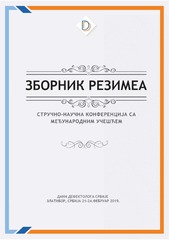Приказ основних података о документу
Korekcioni rad u specijalnoj edukaciji i rehabilitaciji - unapređenje razvoja u ranom detinjstvu
Correctional work in special education and rehabilitation – Enhancing development during early age
| dc.creator | Grbović, Aleksandra | |
| dc.date.accessioned | 2021-06-17T14:05:32Z | |
| dc.date.available | 2021-06-17T14:05:32Z | |
| dc.date.issued | 2019 | |
| dc.identifier.isbn | 978-86-84765-55-2 | |
| dc.identifier.uri | http://rfasper.fasper.bg.ac.rs/handle/123456789/3237 | |
| dc.description.abstract | Preventive and correctional work within a special education and rehabilitation field refers to an array of a specific procedures in treating children with disablities in order to reduce or eliminate developmental issue, as well as to stimulate physical and cognitive functions that education is based upon (Nedović i Rapaić, 2012). Preventive and correctional treatments in education are applied in the form of obligatory out-of-class activities in schools for children with developmental disabilities; or as an additional support for these students in mainstream schools. However, the basis of health outcomes, adaptive behavior and learning are physiological changes that occur during early childhood. Therefore, early intervention must become the foundation for preventive and correctional work within special education and rehabilitation. In our country, early intervention is traditionally related to medical model of care for individuals with disabilities. Enhancing children’s development is, first and foremost, the domain of healthcare, and child development services are operate in community health centers. However, if a pediatrician, pediatric nurse or a health visitor inducts the need for preventive and correctional work, there is no specified protocol for introducing children and families to early intervention programs and neither are there centers where this kind of support could be provided. Regardless of the fact that developed countries leave practice of healthcare system being solely responsible for providing child development services to the families with the youngest children, in Serbia cooperation between sectors and institutions (i.e. team work between specialists of various profiles) is not fully established. In teams that National program for enhancing development during early childhood is planning, special educators and rehabilitators do not have place they deserve, and focus is aimed toward additional education of health workers. Considering the fact that interdisciplinarity, transdisciplinarity and intersectoral cooperation are important preconditions for realizing early intervention programs, it is necessary to raise awareness of those socially responsible about competence, importance and necessity for engaging special educators and rehabilitators in the field of preventive correctional work in the field of education, as well as in the field of providing help to families and children with disabilities within healthcare and social care systems. | |
| dc.description.abstract | Preventive and correctional work within a special education and rehabilitation field refers to an array of a specific procedures in treating children with disablities in order to reduce or eliminate developmental issue, as well as to stimulate physical and cognitive functions that education is based upon (Nedović i Rapaić, 2012). Preventive and correctional treatments in education are applied in the form of obligatory out-of-class activities in schools for children with developmental disabilities; or as an additional support for these students in mainstream schools. However, the basis of health outcomes, adaptive behavior and learning are physiological changes that occur during early childhood. Therefore, early intervention must become the foundation for preventive and correctional work within special education and rehabilitation. In our country, early intervention is traditionally related to medical model of care for individuals with disabilities. Enhancing children’s development is, first and foremost, the domain of healthcare, and child development services are operate in community health centers. However, if a pediatrician, pediatric nurse or a health visitor inducts the need for preventive and correctional work, there is no specified protocol for introducing children and families to early intervention programs and neither are there centers where this kind of support could be provided. Regardless of the fact that developed countries leave practice of healthcare system being solely responsible for providing child development services to the families with the youngest children, in Serbia cooperation between sectors and institutions (i.e. team work between specialists of various profiles) is not fully established. In teams that National program for enhancing development during early childhood is planning, special educators and rehabilitators do not have place they deserve, and focus is aimed toward additional education of health workers. Considering the fact that interdisciplinarity, transdisciplinarity and intersectoral cooperation are important preconditions for realizing early intervention programs, it is necessary to raise awareness of those socially responsible about competence, importance and necessity for engaging special educators and rehabilitators in the field of preventive correctional work in the field of education, as well as in the field of provid | |
| dc.language | en | |
| dc.language | sr | |
| dc.publisher | Društvo defektologa Srbije | |
| dc.rights | openAccess | |
| dc.rights | openAccess | |
| dc.rights.uri | https://creativecommons.org/licenses/by-sa/4.0/ | |
| dc.source | Zbornik rezimea sa stručno-naučne konferencije Dani defektologa Srbije | |
| dc.source | Zbornik rezimea Stručno-naučna konferencija sa Međunarodnim učešćem | |
| dc.subject | preventive and correctional work | |
| dc.subject | early intervention | |
| dc.subject | intersectoral cooperation | |
| dc.subject | preventivno-korektivni rad | |
| dc.subject | rana intervencija | |
| dc.subject | međusektorska saradnja | |
| dc.title | Korekcioni rad u specijalnoj edukaciji i rehabilitaciji - unapređenje razvoja u ranom detinjstvu | sr |
| dc.title | Correctional work in special education and rehabilitation – Enhancing development during early age | |
| dc.type | conferenceObject | |
| dc.rights.license | BY-SA | |
| dc.rights.license | BY-SA | |
| dc.citation.epage | 31 | |
| dc.citation.other | : -31 | |
| dc.identifier.fulltext | http://rfasper.fasper.bg.ac.rs/bitstream/id/3355/bitstream_3355.pdf | |
| dc.identifier.rcub | https://hdl.handle.net/21.15107/rcub_rfasper_3237 | |
| dc.type.version | publishedVersion | |
| dc.type.version | publishedVersion |


